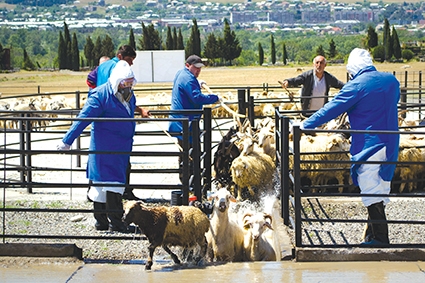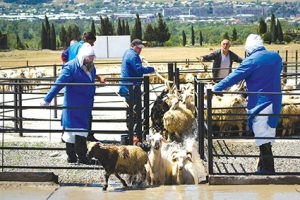Animal Migration Route, Bio Security Points & Sheep Dipping in Georgia
EDITOR"S NOTE: The printed version of this article, as appears in the Friday 16 June issue, differs from the version below and was printed in error. I apologize sincerely for that oversight.
The mass annual migration of up to a million head of sheep and cattle on long established routes is perhaps one of the authenticities of Georgia, as is the century old tradition of sheep farming itself. According to a 2013 report produced by the Swiss Agency for Development and Cooperation (SDC) and Mercy Corps Alliances Programme, the seasonal transhumance is the most widespread system of sheep farming in Georgia: sheep overwintering in Kakheti then move with the coming of spring to summer pastures in the mountains of Tusheti and Mtianeti and the highlands of Kvemo Kartli and Samtkhe-Javakheti walking over 10km a day. The distance between the summer and winter pastures is over 300 km, with shepherds and sheep covering it twice a year. The sheep movement route (Animal Movement Route) covers four regions of Georgia (13,400 hectares of land, and a total length of 11,874.6 km).
Depending on quality and the internal and external market, the price of sheep in Georgia varies from 100 to 200GEL. The major countries for live Georgian sheep export to date have been Azerbaijan, Saudi Arabia, Egypt, Qatar, Kuwait, Iraq, Oman and Israel. The market for processed meat is growing with regular export now occurring to Iran. Wool too is a global commodity, the market for which has been recently revived with greasy unprocessed wool being exported to the UK, Ukraine and India. It is a sector with potential to improve the livelihoods of significant rural inhabitants.
Since the demise of the Soviet Union, a complexity of such factors as the non-existence of modern technologies, outdated infrastructure facilities, lack of qualified veterinarians, lack of registration of sheep movement routes, inadequate sanitary conditions, no sheep vaccinations and no regulations existing, had led to increasingly negative affects on the sector. A major component of this was the neglect of the Animal Movement Route itself, the series of registered byways used by the flocks from winter to summer pastures once maintained with bridges, water points and resting areas for livestock and now badly degraded.
“Since the collapse of Soviet Union there has been little maintenance or development of badly degraded infrastructure or the systems surrounding the Animal Movement Route. This has included no systematic health control in a country with serious notifiable diseases e.g. Foot and Mouth, Anthrax”- states the Additional Report on Bio Security Points carried out by Edward Hammer Ltd.
Not until 2012, when the Swiss Development Cooperation funded Mercy Corps Georgia, implemented Alliances Lesser Caucasus Programme (now Alliances Caucasus Programme – ALCP) began was the Animal Movement Route issue coherently identified and addressed. Ongoing facilitation with multiple stakeholders, governmental bodies, (Governor’s Office of Kvemo Kartli, Ministry of Agriculture of Georgia, National Food Agency), local governments, Private sector and Shepherds Association led to milestone measures such as the construction of the 4km Tsintskaro village by pass, previously a notorious bottleneck for the migrating livestock and flashpoint for conflict between shepherds and villagers, the first Shepherds Association Conference and the making and release of The Road a documentary film about the route was released bringing the issue to a wider audience. These built the confidence and will of stakeholders to continue investing in solving the complex issue. An international consultant was brought in to help design a national bio security control system for the route resulting in the design of six Bio Security Points (BSPs) (with sheep dipping baths and cattle showers) as part of Animal Route infrastructure management, with proper vaccination ensured, in order to battle and further prevent the spread of deadly diseases.
In 2015, a Memorandum of Understanding was signed between the Ministry of Agriculture, The National Food Agency (NFA) and Mercy Corps for joint co-investment under which two BSPs with water points would be built on the Animal Movement Route in the region of Kvemo Kartli financed by the ALCP, and three BSPs would be built in Kakheti and one in Kvemo Kartli, financed by the state.
In July and September 2015, construction of the first yards and water points began in Kvemo Kartli, Marneuli and Rustavi municipalities, followed by Dedoplistkaro and Sighnaghi, all finalized in 2016. Now four BSPs are fully functioning and a further two BSPs are to be completed in Bolnisi and Telavi by the end of 2017. The service is provided by the National Food Agency free of charge, with shepherds saving about 200 GEL per 1000 heads of livestock- the price of private dips which, despite a decreasing number, still exist throughout the country.
Not only are the BSPs a tool against the spread of disease, they have also proven to be a critical instrument for the government to access information on livestock, and to monitor the situation in the sector, something that was impossible to regulate before. In addition, timely vaccination and sheep dipping is directly related to a decreased number of animal deaths en-route, animals which were often left where they fell, scavenged by wildlife and dogs, bringing yet other dangerous health risks for humans while passing rotting carcasses.
One of the major benefits of the BSPs is said to be an increased opportunity to facilitate sheep and wool export, which is one of the motivations behind developing the sphere.
Also among the most important issues related to BSPs is toxic waste disposal. The toxic insecticides used in sheep dips need to be properly stored and disposed of, yet, with private dips, such processes in the past were unmonitored and unregulated; incorrect disposal of highly toxic insecticides often resulting in dramatic damage to the environment. Following the recommendation given by Edward Hamer LTD, and also according to international best practice, Cypermethrin sheep dip has been replaced with other products acknowledged for use by international veterinary organizations.
“It is important for sheep to be dipped before they head to the mountain pastures,” Zurab Ivanishvili, veterinarian at BSP Marneuli told GEORGIA TODAY, noting they can dip almost 10,000 sheep a day at the facility. “We need more employees,” he added, also mentioning that the construction needs some improvements. “The sheep dipping started on May 10 at Marneuli BSP, all the stock that passed, dipped or not, were identified and registered. At all BSPs in Sighnaghi, Dedoplistskharo, Rustavi and Marneuli, different color notes are issued to categorize that the sheep are dipped,” he said.
Although construction of the BSPs on animal movement route can undoubtedly be considered as a milestone, one of the significant challenges the sector faces is the lack of resting areas both for shepherds, sheeps and cattle along the route. Following the collapse of the system , much of the formerly designated land of the route had been sold to private land owners, which is a source of conflict between the shepherds and the owners of the land. At the same time, there’s a considerable lack of watering points along the route.. On the positive side, we’ve been told that the government is now actively working on resolving the issue, negotiating with the land owners to re-acquire the land from them, or attain alternate land for use, the next step in the multi stakeholder process that managed to raise the animal movement route infrastructure improvement to the top priorities of the government’s agenda. The ALCP is currently analyzing the benefits brought by the construction of Bio Security Points on the Animal Movement Route, and, according to its preliminary findings, the trend of more and more farmers preferring to use the newly constructed BSPs and sheep dips over privately-owned ones is clear. With the BSPs, farmers no longer need to buy medicine for sheep dipping, since it is provided free at the facilities. The process of sheep dipping is also easier now, the farmers have noted, since all the BSPs are designed with appropriate handling facilities for large volumes of livestock, are equipped with fences, and no sheep is lost, or as in the case of private dips, stolen. At the same time, qualified vets are on hand to assist and provide guidance on sheep and cattle health issues. Further, perhaps most importantly, the BSPs tend to be financially beneficial for the farmers, as they don’t need to pay for additional personnel to help them with the dipping.
Notwithstanding the fact that there are still a number of issues that need to be addressed, the BSP Project initiated and realized by the programme can be seen as a poweful example of successful state-private partnership and cooperation, using a systematic approach while identifying problems and showing readiness to solve them effectively.
A Bio Security Department has been created at the The National Food Agency and the drafting of a Bio Security Strategy is underway.
“The Bio Security Strategy will be a long term plan on what future steps from government should be undertaken. For now we’re working on ensuring that every Bio Security Point is functioning properly, we’re looking on their possible transmission to the private sector in the future”, Lasha Avaliani, Head of Veterinary Department at the National Food Agency told us, as he also pointed that the toxic waste disposal process is fully taken care of already.
The number of BSPs (6) is relevant and capable to serve all nomadic farmers using the south & Kakheti part of AMR. The number of BSPs as well as the locations were identified and agreed by the international expert together with the Ministry of Agriculture and Georgian Shepherds Association
By Nino Gugunishvili











